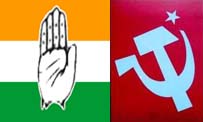Measures taken by Centre to check prices not enough, say Communists
 New Delhi, Apr 1: While markets, exporters and importers of key commodities like steel and crude edible oils are yet to react to the Government’s decision to abolish import duties on some items, and a ban on exports, the Left parties, who currently offer outside support to Government, have described the measures announced to check the rising prices of essential commodities as inadequate.
New Delhi, Apr 1: While markets, exporters and importers of key commodities like steel and crude edible oils are yet to react to the Government’s decision to abolish import duties on some items, and a ban on exports, the Left parties, who currently offer outside support to Government, have described the measures announced to check the rising prices of essential commodities as inadequate.
“They are half-hearted measures,” the Communist Party of India (CPI) said while demanding a complete ban on futures trading of essential commodities.
The Communist Party of India-Marxist (CPI-M) attributed the cause of inflation to widespread speculation in trading, and claimed that the United Progressive Alliance (UPA) Government had paid no heed to concerns over the price hike raised by them from time to time.
The CPI-M also threatened to launch a nationwide agitation from April 15 against the Government’s failure to curb rising prices.
Surging prices of essentials such as wheat, sugar, edible oils and steel attracted heated protests from the Left allies and the Bharatiya Janata Party (BJP).
The recession in the US economy, rising demand in developing nations, severe weather, bio fuel production and hot commodity markets have all contributed to the price rise.
The Cabinet Committee on Prices (CCP) chaired by Prime Minister Manmohan Singh on Monday, decided to abolish import duty on all crude edible oils, including palm and soya, and banned the export of non-basmati rice and pulses to contain inflation that is at a 13-month high of 6.68 per cent.
All edible oils in crude form can now be imported at zero duty as against 20 per cent now, excluding soya, while the duty on oils in the refined form and vanaspati will be 7.5 per cent compared to 27.5 per cent and 20 per cent respectively.
The CCP approved the ban on export of non-basmati rice with immediate effect and decided to extend the ban on pulses export for one more year from Monday, Union Finance Minister P. Chidambaram said after the meeting that lasted over three hours at Manmohan Singh’s official residence.
The Government also decided to raise the Minimum Export Price of basmati rice to 1,200 US dollars per ton from 1100 US dollars, to balance the demand – supply in the domestic market and to cut import duty on butter and clarified butter (ghee) from 40 per cent to 30 per cent, besides, the 15 per cent import duty on maize was abolished, applicable on import of up to five lakh tons.
The CCP also advised states to impose limits on stocks of commodities under the Essential Commodities Act, besides asking steel producers not to raise prices.
However, a decision on duty reduction on iron and steel was deferred as Steel Minister Ram Vilas Paswan was away from the country.
Steel producers have increased prices between Rs 3,500 to Rs 4,000 per tonne during the past three months, triggering concerns among dealers and realty developers.
A meeting among Ministry of Commerce and Industry, Ministry of Steel and steel producers is expected to be held today.
CPI (M) General Secretary, Prakash Karat said: “The Government does one thing with the right hand and the other with the left back to back,” while the BJP leader, Ravishankar Prasad said: “The UPA has betrayed the aam aadmi”.
The Congress Party also asked the Government to ban futures trading in more farm items to keep prices under check.
Future trading is already banned on staple commodities like rice, wheat and pulses like urad and tur.
A meeting of the three national commodity exchanges called by the Ministry of Consumer Affairs sought their views on whether a few more essential commodities like potato and edible oils be banned from the future trading to check prices. (ANI with inputs)